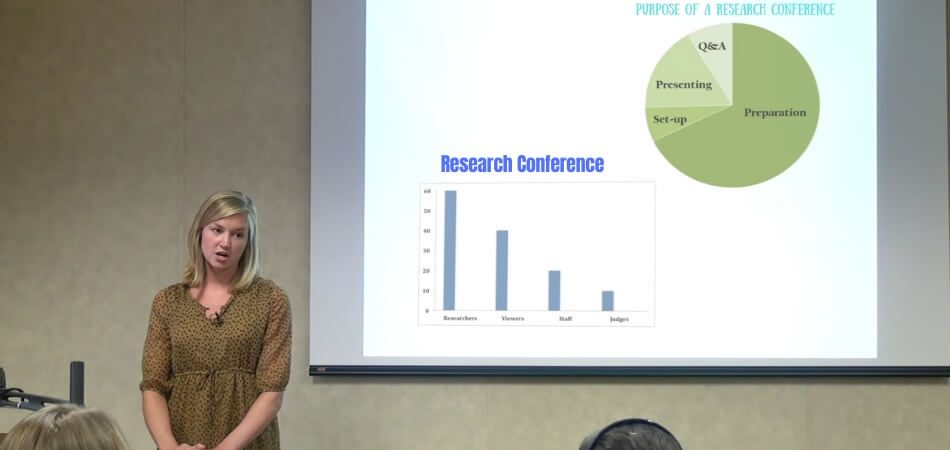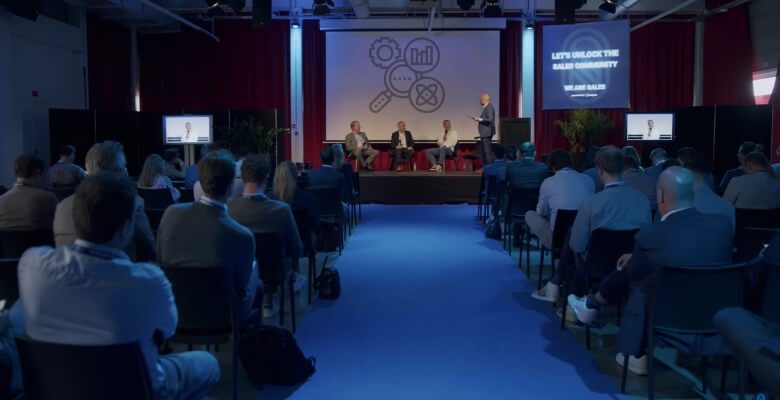Research conferences play a crucial role in advancing knowledge, promoting collaboration, and driving innovation within the academic and professional communities. They provide a platform for experts and aspiring researchers to come together, share ideas, and engage in the latest developments in their field.
But what is the purpose of a research conference?
At its core, it offers a space for individuals to present their findings, gain valuable feedback from peers, and refine their research. These events also help disseminate groundbreaking discoveries and facilitate discussions that strengthen the field as a whole.
Curious to learn more? Follow along as we dive deeper into why these conferences are essential and how they contribute to the growth of knowledge across various disciplines.
What the Research Conference is All About?
Research conferences are gatherings where scholars and professionals share insights and discoveries. They promote collaboration and offer feedback that enhances ongoing projects. If you’re considering attending, our guide on finding a research conference can help you choose the right one. These events often highlight cutting-edge advancements across various fields.
By attending these conferences, participants can network with peers and learn from experts. They also get a chance to present their own work, which can open doors to new opportunities and collaborations. Engaging directly with innovative research inspires attendees and broadens their academic or professional horizons. Each conference serves as a catalyst for further exploration and discovery.
What is the Purpose of a Research Conference?
Research conferences are crucial platforms where scholars and professionals gather to push the boundaries of knowledge. They are vital for sharing recent findings, receiving feedback, and networking with peers. Each aspect of a conference serves a distinct purpose, enhancing the professional journey of attendees.
Knowledge Exchange
Researchers present their findings, engaging with a community eager to learn and debate. This exchange promotes the spread of new ideas and methodologies, ensuring that knowledge remains dynamic and current. It’s a venue where seasoned academics and new scholars alike can gain insights into cutting-edge developments.
The dialogue initiated at conferences challenges assumptions and pushes scientific boundaries. Participants discuss theoretical implications and practical applications, which can lead to significant breakthroughs. Such interactions are critical for the advancement of any field, providing a foundation for future research and innovation.
Ultimately, the knowledge exchanged at these conferences can inspire attendees to explore new research directions. It connects disparate ideas and fosters interdisciplinary approaches, enriching the academic discourse. This is why many researchers consider conferences a cornerstone of their professional development.
Feedback and Improvement
Presenting research in a conference setting allows researchers to receive constructive criticism from their peers. This feedback is crucial for refining research questions, improving methodologies, and clarifying results. It’s an opportunity to engage with others who share a keen interest in the topic.
This feedback loop not only enhances the quality of the research presented but also helps in identifying areas that need more rigorous exploration. Such interactions are invaluable as they provide a fresh perspective, often leading to significant improvements in the research work.
Moreover, the critique received during these sessions helps researchers prepare for the publication process. It ensures that their work can withstand the scrutiny of peer review, increasing the likelihood of being published in respected journals.
Networking
Conferences provide a unique opportunity for researchers to build professional networks. These connections can lead to collaborations, sharing of resources, and even joint grant applications. Networking is particularly beneficial for early-career researchers looking to establish themselves in their fields.
Through these interactions, attendees can learn about job openings, postdoctoral positions, and other career opportunities. Networking at conferences often results in fruitful collaborations that might not have been possible through other avenues. It’s a chance to meet potential mentors and collaborators in informal settings.
Furthermore, the relationships formed at conferences can provide long-term support and guidance throughout one’s career. These connections are often invaluable when seeking advice on research directions, navigating career transitions, and finding collaborators for new projects.
Professional Development
Conferences often feature workshops, tutorials, and panel discussions that are designed to refine participants’ skills. These sessions cover the latest research methodologies, advanced technologies, and emerging trends. They are essential for researchers who wish to stay ahead in their field.
Participating in these developmental activities allows researchers to acquire new skills that enhance their work’s impact and efficiency. It’s an investment in their professional growth, equipping them with tools to tackle contemporary challenges in their research areas.
Additionally, these educational sessions provide a broader understanding of the field, which can inspire new research questions and methodologies. They are a key component of continuous professional development, ensuring that researchers remain competent and competitive.
Dissemination of Research
Conferences act as a key venue for disseminating new knowledge and findings beyond the immediate research community. Presenting work to a diverse audience promotes wider recognition and validation, which is crucial for academic success.
This exposure not only enhances the visibility of the research but also invites scrutiny and debate, which can further refine the work and increase its impact. It’s an essential step in the process of contributing to the academic discourse at a global level.
Moreover, many conferences publish proceedings or special journal issues featuring research presented at the conference. This published work becomes part of the global academic record, accessible to researchers and practitioners worldwide, further extending the reach and impact of conference presentations.
Career Opportunities
Many conferences include career fairs and exhibition areas where organizations and universities showcase their opportunities. Researchers can connect with potential employers, learn about new research facilities, and explore funding sources. These events are especially valuable for those seeking to advance their careers.
Job fairs at conferences provide a platform for researchers to present themselves as viable candidates to a range of employers within their field. It’s an opportunity to make impressions that could lead to job offers, collaboration invitations, or even consulting opportunities.
In addition, conferences might offer sessions on career development, such as resume workshops, interview skills seminars, and discussions on career paths in academia and beyond. These resources are crucial for researchers at all stages of their careers, particularly for those looking to make significant moves or transitions.
Why Should You Attend a Research Conference?
The experience of attending a research conference can be transformative, offering more than just a chance to present your research. These events bridge the gap between solitary research and collaborative insight, providing a unique blend of learning, networking, and development. If you’re on the fence about whether to attend, consider the multitude of benefits that these conferences offer.
Exposure to Latest Research
At conferences, you witness the unveiling of the latest studies and innovations in your field. This exposure keeps you abreast of cutting-edge developments and current trends. You’ll see how your work stacks up and what new directions are emerging. It’s a chance to fuel your curiosity and inspire future projects.
Valuable Feedback on Your Work
Presenting your research provides a chance to refine it through diverse, external perspectives. Feedback from seasoned experts and peers helps identify potential weaknesses and areas for improvement. Such critiques are invaluable as they prepare you for publication and further research. This process strengthens your work’s credibility and impact.
Networking with Peers and Mentors
Conferences serve as a melting pot for professionals from various backgrounds and expertise levels. Here, you can form connections that might lead to future collaborations or mentorship opportunities. Networking can open doors to job offers, research partnerships, and unique project ideas. These relationships often prove crucial throughout your career.
Professional Skill Enhancement
Participating in workshops and seminars at conferences helps polish existing skills and learn new ones. These sessions are tailored to keep you updated with the latest methods and technologies in your field. They provide practical, hands-on experience that you can apply to your research or teaching. Staying updated is key in maintaining a competitive edge.
The reasons to attend a research conference go beyond the mere presentation of your work. They are about growing as a researcher and a professional, staying informed, and connecting with the community.
Whether you’re looking to sharpen your skills, expand your network, or just find some inspiration, a research conference is the place to be. Don’t miss out on the chance to engage deeply with your field and its community and you get access to all the necessary information about the upcoming research conference from conference based websites. These resources can help you plan your participation effectively, ensuring you make the most of every opportunity.
Future Trends in Research Conferences: What’s Next?
As the academic landscape evolves, so too do the formats and features of research conferences. With technology driving change and greater emphasis on inclusivity, these gatherings are set to transform. Here’s what we can anticipate for future research conferences:
- Virtual Reality (VR) Integration: Virtual reality could bring remote attendees right into the conference room. This technology will make sessions more interactive and immersive, regardless of physical location.
- Hybrid Formats: More conferences will offer both in-person and online participation options. Hybrid models provide flexibility and increase accessibility for global attendees.
- Data-Driven Customization: Using AI, conferences can offer tailored experiences, recommending sessions based on attendees’ research interests. This personalization will enhance engagement and learning outcomes.
- Increased Focus on Sustainability: Future conferences will prioritize eco-friendly practices to minimize their carbon footprint. This shift is crucial as the academic community becomes more environmentally conscious.
- Enhanced Networking Tools: New apps and platforms will facilitate networking before, during, and after the conference. These tools will help attendees form meaningful connections with precise alignment to their interests.
- Interdisciplinary Themes: Upcoming conferences will increasingly emphasize cross-disciplinary research. This approach fosters collaboration and innovation across traditional boundaries.
The future of research conferences looks bright, with technological advancements and a push towards more sustainable and inclusive practices. These changes promise to make conferences more effective and engaging, ensuring they remain a cornerstone of academic and professional development. As we move forward, embracing these trends will be key to maximizing the value of every conference experience.
How Should You Prepare Yourself for a Research Conference?
Preparing for a research conference can make a significant difference in how much you gain from the experience. With the right steps, you’ll feel more confident, organized, and ready to connect with other professionals. Here’s a simple guide to help you make the most of your conference preparation.
Step 1: Set Clear Goals
Determine what you want to achieve at the conference, whether it’s networking, learning, or presenting your research. Identifying specific objectives helps you focus on relevant sessions and discussions. Knowing your goals also makes it easier to prioritize events and maximize your time. Clear intentions provide a roadmap for a productive and purposeful conference experience.
Step 2: Research the Agenda and Speakers
Review the conference agenda to identify key sessions, workshops, and speakers you don’t want to miss. Look up speakers and familiarize yourself with their research to prepare insightful questions. Planning ahead ensures you’re fully engaged and prepared to participate in meaningful discussions. This approach can also help you make valuable connections with experts in your field.
Step 3: Prepare Your Materials
Bring everything you need, including business cards, presentation slides, and any necessary equipment for your session. If you’re presenting, practice your talk and consider suitable attire for research conference settings to ensure a professional appearance. Having materials prepared in advance allows you to focus on networking and learning without unnecessary stress. Good preparation will make a positive impression on peers and colleagues.
Step 4: Plan Your Networking Approach
Think about how you’ll approach networking and which contacts you want to make during the conference. Set a goal for meeting specific people, and be open to unexpected connections too. A friendly, genuine approach can create opportunities for future collaborations and partnerships. Effective networking helps you build meaningful relationships that support your professional growth.
Frequently Asked Questions About What is the Purpose of a Research Conference?
Research conferences serve as vital platforms for professionals to share insights, connect, and explore advancements within their fields. They create opportunities for learning, collaboration, and professional development. Here are five frequently asked questions about the purpose of a research conference.
What Types of Presentations Are Common at Research Conferences?
Research conferences typically feature keynote speeches, panel discussions, poster presentations, and workshops. These formats allow experts to present findings, encourage interactive discussions, and share knowledge in diverse, engaging ways that cater to various learning and engagement preferences.
How Do Research Conferences Foster Innovation?
Research conferences encourage innovation by bringing together professionals who share ideas, discuss challenges, and brainstorm solutions. This collaborative environment inspires creative thinking, leading to new approaches, methods, and potential research advancements in the respective field.
Who Benefits from Attending Research Conferences?
Researchers, academics, students, and industry professionals all benefit from attending these events. Attendees gain knowledge, receive feedback on their work, and establish valuable connections that foster both personal and professional growth within their specialized area.
How Can Research Conferences Impact a Researcher’s Career?
Presenting at conferences can significantly boost a researcher’s career by increasing their visibility and credibility. Sharing research with peers provides recognition, constructive feedback, and opportunities for collaboration, all of which support career advancement and professional reputation.
Are Research Conferences Useful for Early-Career Researchers?
Early-career researchers greatly benefit from conferences as they gain exposure to the latest trends and practices. These events offer opportunities to network with seasoned professionals, receive mentorship, and improve presentation skills in a supportive, professional setting.
Endnotes
In essence, attending a research conference can be a transformative experience, providing invaluable opportunities to learn, connect, and grow within your field. From gaining feedback to exploring the latest innovations, these events foster personal and professional development.
If you still have any confusion about, what is the purpose of a research conference? leads us to realize its role in bridging gaps between solitary research and collaborative growth. Each session, workshop, and conversation contributes to a researcher’s journey, enriching the collective knowledge within a discipline.








